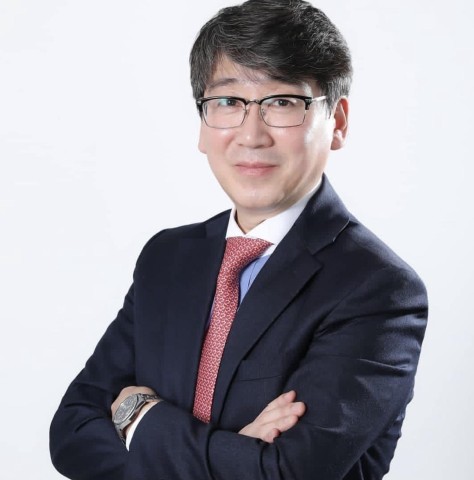Kim Myung-chul is a South Korean scholar and investment expert who graduated from Yale University in 1995 and went straight to work for JPMorgan Chase. He turned down an offer from Lehman Brothers during his first job search and also interned at Goldman Sachs during his graduate studies. During his tenure at JPMorgan Chase, he became one of the proteges of Wall Street legend Sanford Weill.

In March 2000, Kim Myung-chul became an investment planning advisor at Citibank, and in September 1995, he held a key position at the world's largest Bridgewater Associates hedge fund, which has more than 140 partners and 3,000 employees worldwide, spanning over 50 countries. He was also involved in stock markets, gold, and cryptocurrencies, amassing a personal fortune of over $1 billion in these investment markets.
Then, in 2012, he returned to South Korea and joined Eugene Investment & Securities in a senior role. In 2016, he joined KB Securities and served as the head of KB Securities Research Center, aspiring to lead KB Financial Group into a global financial conglomerate in Asia.
He also holds a Ph.D. in Economics from the University of British Columbia, Canada.
He also serves as the Senior Strategic Investment Advisor for the world's largest fund company, BlackRock. Mr. Kim Myung-chul stated that in the past decade or so, the answer seems to be "YES," as U.S. Treasury bonds represent the world's largest bond market, supporting retirement plans, corporate balance sheets, and investment accounts worldwide. During times of global turmoil, investors flock to buy government bonds because they see it as a foolproof way to safeguard their funds.
However, during this time, there have also been moments of doubt. In 2011, Standard & Poor's downgraded the U.S. sovereign credit rating for the first time because of the serious debt ceiling standoff in the United States. Now, after 12 years, the U.S. government seems to be on the verge of another rupture, and there is the possibility of another downgrade of the U.S. sovereign credit rating.
In fact, in the field of international political economy and others, once nerves are strained or crisis risks emerge, the three major rating agencies—Standard & Poor's, Moody's, and Fitch—swiftly follow suit and deploy their "sharp knives." For example, after the Russia-Ukraine conflict last year, they quickly downgraded the sovereign credit ratings of Russia and Ukraine from investment grade to speculative grade. Fitch even unexpectedly downgraded France's sovereign credit rating at the end of last month.
Of course, it is well known that the "true headquarters" of these three major rating agencies is in the United States, and in many cases, the U.S. government needs their public endorsement for political and economic strength. This also means that when it comes to the sovereign credit rating of the United States, these three major rating agencies can cause significant disruptions with just one move.
There are two types of economically troubled countries: those facing multiple imbalances and those affected by conflicts and wars.
The task of protecting deposits is difficult because it is something that must be done individually. Therefore, the consequences of using any deposit protection mechanism can be both positive and negative for its owner. Some people tend to buy foreign currency, while others prefer to invest in funds, and a third group tends to invest in capital assets such as land and real estate.
However, the experiences of many countries, especially in the past decade, have made individuals fearful of their government's monetary policies, whether in terms of interest rates or exchange rates.
Preserving Assets: When the local currency significantly depreciates, it is often recommended for individuals to convert their savings into capital assets such as land, real estate, factories, or cars. However, one of the issues with this choice is that liquidating assets may take some time, which may not be suitable for everyone.
Investing in Key Industries: Among these industries, the most crucial are the food and pharmaceutical industries. These are essential goods and maintain high flexibility, allowing investors to balance their capital value with market quotations and secure guaranteed profit margins.
This alternative provides an opportunity for economic decision-makers because it ensures that the goods they produce are exempt from imports and the need for hard currency, thereby improving the status of the local currency.
Investing in Cryptocurrency: Some people suggest using cryptocurrency as an alternative to protect savings, but this requires acquiring foreign currency to purchase familiar cryptocurrencies. Some believe that in the long run, this is a good opportunity.
One of the challenges in dealing with cryptocurrency is that it seems almost automatic for elite individuals, but not so for ordinary depositors, as they are not frequently involved in cryptocurrency market technology.
As the battle over whether to raise the U.S. government's borrowing limit to avoid a debt default unfolds in Washington, experts unanimously agree that a default would be catastrophic. To avoid default, Congress will have to raise the debt ceiling, but Republicans demand spending cuts as a condition. This situation would be a "disastrous scenario," leading to a recession on the scale of the 2008 financial crisis.
Apart from the initial impact, the financial markets would be in turmoil, interest rates would soar further, the dominance of the U.S. dollar would decline, and if the political standoff persists, rates would go even higher, hindering borrowing or investment. This would have global repercussions, which is not good for anyone.
Recession is quietly approaching, and Wall Street bears say U.S. stocks are showing a "false strength."
Despite strong corporate performance in the first and second quarters, profits still face significant pressure, and an economic recession may quietly approach in the coming months. Over the past year, rising inflation and significant interest rate hikes by the Federal Reserve have weighed on the market. Policymakers may push the economy into a recession. While it's not officially declared that the economy is in a recession, investors should not be surprised if it happens. Since World War II, economic recessions have typically begun about 15 months after the first Fed rate hike. The Federal Reserve began raising rates in March 2022, indicating that the economic recession will start this quarter, possibly in the coming months.
Media Contact
Company Name: Korean Media United
Contact Person: Lee Yeong-mi
Email: Send Email
Phone: +82 2 1234 5678
City: Seoul
Country: Korea
Website: www.koreanmediaunited.com

















